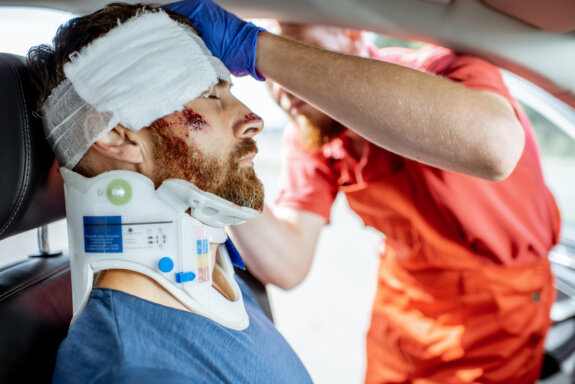Rear-end car accidents are, unfortunately, one of the most common types of collisions on the road, often resulting in severe, life-altering injuries for those involved. These accidents occur when a vehicle crashes into the vehicle in front of it, typically caused by factors such as speeding, distracted driving, or hazardous road conditions. The consequences can be especially devastating when the impact leads to catastrophic injuries, such as spinal damage or traumatic brain injuries, profoundly altering the lives of individuals and their families forever.
Understanding Rear-End Car Accidents
Rear-end car accidents occur when one vehicle collides with the back of another. These incidents often happen in heavy traffic, where sudden stops are frequent, or due to distracted driving, such as texting or adjusting the radio. The driver at the back, failing to maintain a safe distance or attention to the road, typically bears responsibility. Understanding the dynamics of these crashes is crucial, especially in severe cases that lead to catastrophic outcomes. Recognizing the common causes helps in both preventing future accidents and navigating the legal landscape if you find yourself a victim of such an incident.
Common Causes of Catastrophic Rear-End Accidents
Catastrophic rear-end accidents often result from a few common yet preventable causes. Identifying these can help in understanding liability and prevention:
- High Speeds: Driving at excessive speeds significantly reduces reaction time, making it difficult to stop quickly.
- Distracted Driving: Activities like texting, eating, or using in-car technologies distract the driver from the road ahead.
- Heavy Traffic: Frequent stop-and-go conditions increase the likelihood of collisions if drivers are not attentive.
- Poor Weather Conditions: Rain, fog, or icy roads can impair a driver’s ability to see and stop in time.
- Mechanical Failures: Faulty brakes or worn tires can prevent a vehicle from stopping properly.
Each of these factors can contribute to the severity of a rear-end collision, underscoring the importance of cautious and attentive driving.
The Consequences of Catastrophic Rear-End Collisions
Catastrophic rear-end collisions often lead to severe, life-altering injuries that can devastate victims and their families. Common consequences include traumatic brain injuries, which can affect cognitive functions and emotional control, and spinal cord injuries, potentially resulting in partial or complete paralysis. Such injuries not only cause immense physical and emotional pain but also create financial burdens due to extensive medical bills, ongoing care costs, and lost income. The ripple effects extend into every aspect of a victim’s life, impacting their ability to work, engage in social activities, and maintain independence.
Legal Rights and Options
Victims of catastrophic rear-end collisions have specific legal rights that enable them to seek compensation for their suffering and losses. It’s important to understand that you may be entitled to damages covering medical expenses, lost wages, and pain and suffering. Additionally, if the accident resulted in long-term disability or required ongoing medical treatment, you could claim future medical costs and lost earning capacity. A seasoned personal injury attorney can advocate on your behalf, ensuring that insurance companies and responsible parties fairly compensate you. Contacting a lawyer promptly after an accident increases your chances of securing the full range of legal remedies available.
Contact Our Experienced Walnut Creek Rear-End Accident Attorneys
At Casper, Meadows, Schwartz & Cook, we represent victims of catastrophic rear-end collisions. Our experienced attorneys handle every aspect of your case, from investigating the scene and gathering crucial evidence to negotiating with insurance companies. We strive to secure the maximum compensation you deserve, allowing you to focus on your recovery without the stress of financial strain. If you’ve suffered in a rear-end accident, don’t face this challenge alone. Contact us today for a free consultation, and let us help you start the journey towards recovery and justice.

